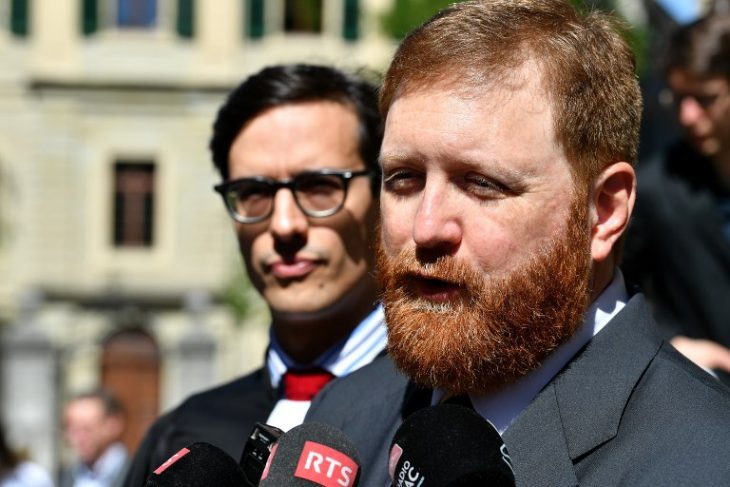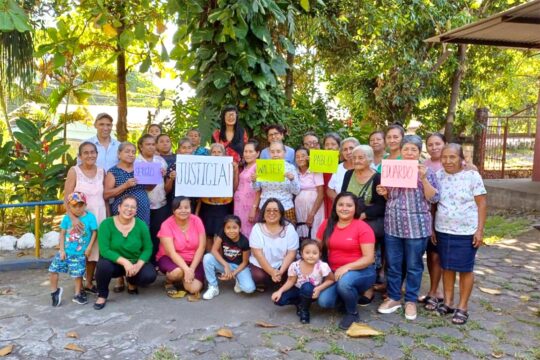A 15-year prison sentence handed down by a Geneva court on former Guatemalan police chief Erwin Sperisen for complicity in the 2006 murder of seven prison inmates is an “important step in the fight against impunity for State crimes”, says Swiss NGO Trial International, which helped bring the case. It is a rare case of a person being tried in Switzerland for crimes committed on foreign soil.
The court also awarded the plaintive, the mother of one of the murdered prisoners, CHF 30,000 as compensation.
“This verdict demonstrates the healthy functioning of our institutions, and gives hope to victims as well as to individuals and organizations committed to the fight against impunity in Guatemala,” says Trial International’s director Philip Grant in a press release.
Sperisen’s lawyers say they are appealing to Switzerland’s Federal Court. And despite the sentence, the former police chief has not been sent back to jail, from which he was freed last autumn and put under judicial surveillance. He has already spent five years in preventive detention, which will be reduced from his final sentence.
On April 27, 2018, the Geneva Court of Justice found Sperisen criminally responsible for contributing to a 2006 operation aimed at taking back control of the Pavon prison in Guatemala, during which seven prisoners were summarily executed. The court deemed that Sperisen had acted as an accomplice in the murders, but did not find him fully responsible as a co-author.
The former police chief was tried in Switzerland because he has dual Guatemalan and Swiss nationality, and Switzerland does not extradite its citizens.
A long saga
But the judicial process has been long, with many twists and turns. Sperisen was first sentenced to life imprisonment by a Geneva court in 2014, and the verdict was upheld in 2015, when his first appeal against a lifetime jail sentence was denied. However, Switzerland’s Federal Court last year ordered a re-trial. The Federal Court considered that Sperison had not been granted the necessary rights in terms of bringing witnesses. But it confirmed a substantial part of the facts, notably that the detainees’ deaths were planned and were not the result of an armed conflict but brought about by members of the police and close associates of Sperison.
Trial International says it “welcomes the fact that the Geneva authorities conducted the trial to its end, fulfilling their responsibility in providing justice to victims of the gravest human rights abuses”.
And so Sperisen was finally found guilty of complicity, rather than direct responsibility for the murders, as he was originally charged. “We are satisfied with the verdict, which recognizes the guilt of Erwin Sperisen and sentences him to 15 years in prison for complicity as Guatemala’s police chief in extrajudicial executions,” says Trial International’s head of criminal law and investigations Bénédict De Moerloose. “That is a very serious crime.”
Important for Guatemala and Switzerland
“This verdict has been met with great satisfaction on the part of the victims and all those fighting to defend human rights in Guatemala,” De Moerloose told JusticeInfo. For example, one Guatemalan human rights activist writes that “this decision comes at a difficult time for the fight against impunity in Guatemala. It is a source of hope renewed for justice”.
Indeed, the Swiss court’s sentence comes at a time when the International Commission against Impunity in Guatemala (CICIG), a UN-sponsored body created in 2007 to help Guatemala combat crime and impunity, is under pressure from elements of the élite.
De Moerloose says the verdict is also important for Switzerland. “For Switzerland, this verdict shows not only that our country has an important role to play in the fight against impunity, but also that it has the means to carry it out,” he told JusticeInfo.
As for the length and cost of the judicial procedures, De Moerloose has no doubt they are worthwhile. “The impact of such a judgment is immense, and since Erwin Sperison has Swiss nationality, it was natural that a Swiss court try his case,” he says. “The cost is small compared with the price paid by the victims and the price paid by the international community for State crimes.”







